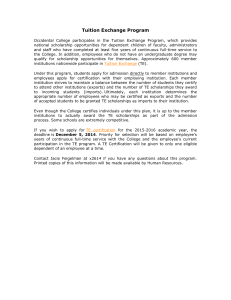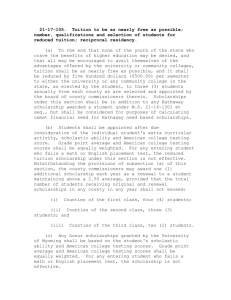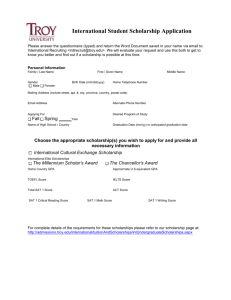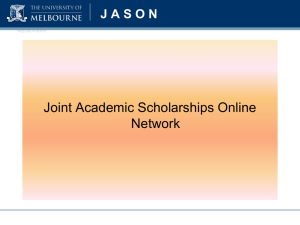JCHS Guide for Exchange Scholars and their Families
advertisement
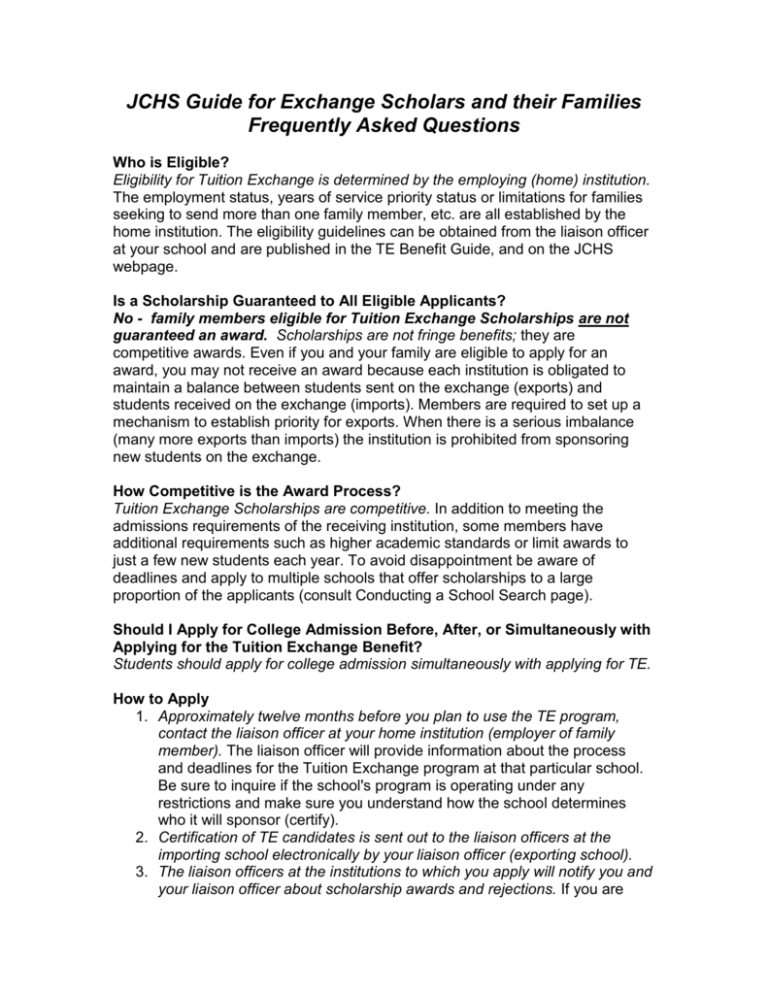
JCHS Guide for Exchange Scholars and their Families Frequently Asked Questions Who is Eligible? Eligibility for Tuition Exchange is determined by the employing (home) institution. The employment status, years of service priority status or limitations for families seeking to send more than one family member, etc. are all established by the home institution. The eligibility guidelines can be obtained from the liaison officer at your school and are published in the TE Benefit Guide, and on the JCHS webpage. Is a Scholarship Guaranteed to All Eligible Applicants? No - family members eligible for Tuition Exchange Scholarships are not guaranteed an award. Scholarships are not fringe benefits; they are competitive awards. Even if you and your family are eligible to apply for an award, you may not receive an award because each institution is obligated to maintain a balance between students sent on the exchange (exports) and students received on the exchange (imports). Members are required to set up a mechanism to establish priority for exports. When there is a serious imbalance (many more exports than imports) the institution is prohibited from sponsoring new students on the exchange. How Competitive is the Award Process? Tuition Exchange Scholarships are competitive. In addition to meeting the admissions requirements of the receiving institution, some members have additional requirements such as higher academic standards or limit awards to just a few new students each year. To avoid disappointment be aware of deadlines and apply to multiple schools that offer scholarships to a large proportion of the applicants (consult Conducting a School Search page). Should I Apply for College Admission Before, After, or Simultaneously with Applying for the Tuition Exchange Benefit? Students should apply for college admission simultaneously with applying for TE. How to Apply 1. Approximately twelve months before you plan to use the TE program, contact the liaison officer at your home institution (employer of family member). The liaison officer will provide information about the process and deadlines for the Tuition Exchange program at that particular school. Be sure to inquire if the school's program is operating under any restrictions and make sure you understand how the school determines who it will sponsor (certify). 2. Certification of TE candidates is sent out to the liaison officers at the importing school electronically by your liaison officer (exporting school). 3. The liaison officers at the institutions to which you apply will notify you and your liaison officer about scholarship awards and rejections. If you are accepted for admission, but have had no response to your scholarship application, ask the liaison officer at your home institution to inquire about the status of your application. 4. Award notifications specifies your scholarship's value, details about the institution's charges the duration and conditions for the scholarship. Be sure you understand charges for which you will be responsible, as well as any requirements you must meet in order to continue your scholarship in subsequent years. 5. Notify your liaison officer if you accept the scholarship and enroll, and report the status of your enrollment each academic year so your liaison officer can submit a Recertification Form to continue the scholarship. If you decide to withdraw or transfer to another institution, notify both the host and home school liaison officers promptly. Should I Expect Something in Writing From the Host Institution? Yes, we encourage our members to send a formal letter which outlines the terms and conditions for receipt and/or continuation of the scholarship. How Many Semesters Does the Scholarship Cover? Most scholarships cover four years (eight semesters) of undergraduate education. Institutions have the right to offer scholarships for less than four years. At some schools scholarships can be used for professional and graduate study. What Must a Student Do to Retain a Scholarship? Students must meet the institution's standards for academic performance and personal conduct and other terms and conditions of the scholarship. What Happens if the Employee loses eligibility? The family member whose employment conveyed eligibility for a scholarship must continue to meet the employing institution's eligibility criteria. Annual recertification of eligibility is processed by the home institution. What Is the Dollar Value of The Scholarship? Scholarships cover full tuition, or a rate set by Tuition Exchange, but not special fees, course overloads, or room and board charges. For 2013-2014, institutions that charge more than $31,500 for tuition are permitted to award less than their full tuition, but not less than $31,500. Some colleges cover other expenses, such as room in their awards. The "Conducting a School Search" page contains information indicating which schools offer more than basic tuition. Some member institutions reduce their scholarships by the amount of federal and state grants awarded to a student, whether or not these are based on financial need. The Application/Certification Form notifying you of your award and award letter should provide specific details, but if you are confused, seek clarification by asking questions before you accept the scholarship. Are Tuition Exchange Scholarships Taxable? Because JCHS is an affiliate of Carilion Health Systems, the Tuition Exchange Scholarship is not tax exempt. What Is The Role of Tuition Exchange, Inc.? The Tuition Exchange, Inc. is a nonprofit association based in Washington, DC which promotes and maintains the Exchange on behalf of its members. Scholarships are granted by member institutions, not by The Tuition Exchange, Inc. The officers and directors of The Tuition Exchange, Inc. disclaim responsibility for any misunderstandings among applicants, participants, and institutions concerning the value and duration of scholarships or circumstances which might result in early termination of such scholarships. The Tuition Exchange partnership continues to seek ways to make scholarships more widely available to qualified applicants and to strengthen the Exchange by adding new members. Your suggestions and comments are welcomed.

